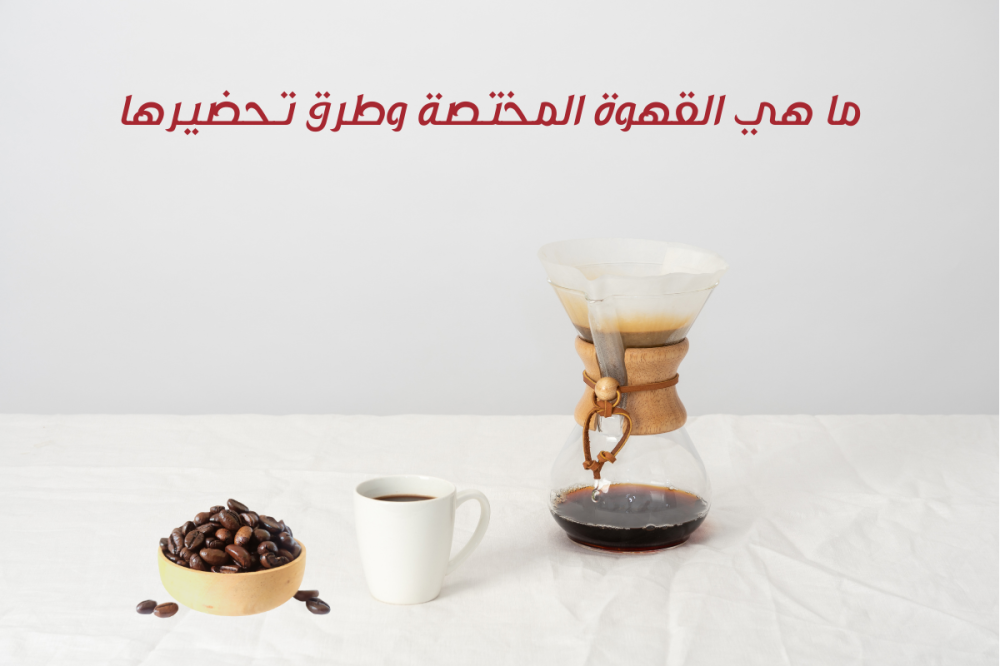In today’s world, coffee has become the most popular and preferred beverage among many people, for several reasons related to personal and cultural experience. Coffee is not just an energizing drink, but a social and cultural experience that brings people together and encourages dialogue and interaction. Coffee lovers enjoy the wide variety of coffee types and preparation methods, allowing them to choose what suits their personal taste and individual preferences. In addition, coffee is part of the morning routine for many, as it is considered the beginning of a new day for them and helps them prepare for the start of their day with energy and vitality. Coffee is also a symbol of gathering, enjoying moments of relaxation and social interaction in our modern society.
Article Contents:
- What is specialty coffee?
- How is specialty coffee made?
- Specialty coffee processing methods
- Washing treatment
- Drying treatment
- Sun drying
- fermentation treatment
- How to choose the best type of specialty coffee
- Is specialty coffee harmful?
- How much caffeine is in specialty coffee?
- Tips for Getting High Quality Specialty Coffee
- Get the best coffee now
What is specialty coffee?
Specialty coffee is coffee that has been roasted and processed, with the beans carefully roasted to bring out the best flavor and aroma of each bean. Specialty coffee is known for its specific geographic origins and small farms, which help support farmers and local communities. This coffee allows consumers to explore a wide range of flavors, from endless acidity to balanced sweetness and creamy textures. With its attention to detail and meticulous processes, specialty coffee reflects a world of care and enjoyment in every cup it serves.
How is specialty coffee made?
The process of making specialty coffee depends on precision and craftsmanship in every step, starting from choosing the right coffee beans to presenting it in a way that highlights the beauty and flavors of this beloved drink. Specialty coffee is carefully manufactured according to the best manufacturing standards, as the manufacturing process goes through several stages, which are:
1. Selection of Coffee: The process of making specialty coffee begins with selecting the best coffee beans from specific regions around the world that are known for producing high-quality coffee. Coffee is evaluated based on its flavor, aroma, and distinctive characteristics.
2. Roasting: After selecting the coffee beans, they are carefully roasted in specialized roasters. Roasting is an artisanal process that aims to develop and bring out the coffee’s flavors in a balanced way. The temperature and time are carefully controlled to obtain the perfect result that suits the specific coffee flavor.
3. Grinding: After roasting, the coffee beans are ground to different degrees depending on the preparation method used (such as espresso or cold drip).
4. Presentation: Specialty coffee is served in different forms, such as espresso, drip coffee, or filter coffee. It is presented in an artistic style that reflects the beauty of the coffee and highlights the unique flavors and aromas of each type.
5. Storage and Marketing: Specialty coffee is handled with special care during storage and marketing processes, as its quality is preserved by maintaining appropriate storage conditions and promoting it in ways that enhance its artistic and cultural value.
Specialty coffee processing methods
Specialty coffee processing is one of the most important processes that are carried out on specialty coffee, with the aim of preserving its quality and providing it with distinctive flavours. The type of coffee processing varies between regions and farms, and each has a different effect on the flavour of the final coffee. Attention to detail and skill in every step of processing contributes to the production of high-quality specialty coffee and distinctive flavours that distinguish it from regular commercial coffee. There are several ways in which specialty coffee is processed, here are the most prominent:
Washing treatment:
It is the process of washing the coffee beans with water to remove the coffee husk and outer pulp from the beans after harvest, as well as to remove any foreign materials.
Drying treatment:
In which it is spread evenly on flat surfaces (such as drying beds) to maintain the purity of the flavour.
Sun drying treatment:
Or in temperature- and ventilation-controlled drying machines, in which the coffee is harvested and left to dry naturally with its husks.
Fermentation treatment:
In which the coffee is fermented after it is harvested for a certain period, which in turn leads to the development of distinctive and complex flavours, but it must be carefully monitored to avoid spoiled flavours.
How to choose the best type of specialty coffee
Choosing the best type of specialty coffee depends on several factors related to quality and personal preferences. Therefore, you can use our store, Rafaat Al-Qahwa, to choose the best types you want, as the selection criteria depend on the following:
1. The origin of the coffee, as there are some regions famous for producing high-quality coffee, such as Ethiopia, Colombia, Costa Rica, and others.
2. Roasting method: Roasting should be precise and balanced to best bring out the coffee’s flavours. Specialty coffees are often roasted in specially designed roasters to achieve the desired results.
3. Processing Method There are three main methods of processing coffee (washed, natural, dry processed), and each affects the final flavor of the coffee in a different way. Choose the method that suits your personal taste.
4. Flavors and Texture Taste samples of specialty coffee to evaluate various flavors, such as acidity, sweetness, bitterness, and body (density and texture in the mouth).
5. Information about the roaster. Find out about the roaster that serves specialty coffee. Find out about their track record and reputation in the specialty coffee community.
Is specialty coffee harmful?
Specialty coffee is generally not harmful if consumed in moderation and according to health recommendations, and within moderate doses, which usually range between 200-400 mg of caffeine per day, equivalent to about 2-4 cups of specialty coffee per day. There are also some studies that indicate that moderate coffee may be beneficial to health, such as reducing the risk of heart disease and stroke, and improving brain function and mood. It is worth noting that excessive coffee consumption leads to anxiety, tremors, and insomnia.
How much caffeine is in specialty coffee?
The amount of caffeine in specialty coffee varies depending on several factors, including the type of coffee and the region where it is grown, as well as the roasting method of the coffee and the amount used. However, in general, the percentage of caffeine in specialty coffee prepared by dripping after grinding and adding water ranges from 80 to 120 mg per 8 ounces (240 ml) of coffee. As for the percentage of caffeine in specialty coffee prepared using espresso methods, it ranges from approximately 60 to 80 mg per 30 ml of espresso. You can get the best specialty coffee according to the amount of caffeine you want from the coffee experts specialized in the Rafaha Al-Qahwa store now.
Tips for Getting High Quality Specialty Coffee
To get high quality specialty coffee, all you need is:
Choosing the right store with a good reputation.
Read what is written on the coffee package.
Knowing how to process specialty coffee.
Check the roasting date.
Coffee Luxury is the right store for you and your customers.
Choosing the right coffee shop is vital for any restaurant or café that seeks to provide an exceptional coffee experience to its customers. Through the Rafah Coffee Shop, you can get the finest coffee that gives restaurants and cafés the opportunity to enhance their brand and attract new customers with drinks with a unique and distinctive taste, so browse our store now and learn about a range of the best coffee products that enhance your presence and increase your customer attraction.

